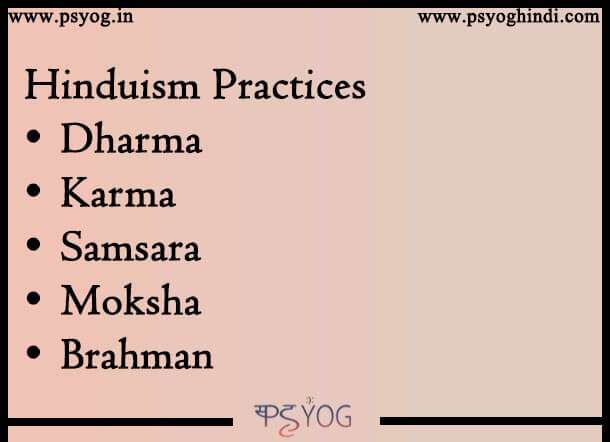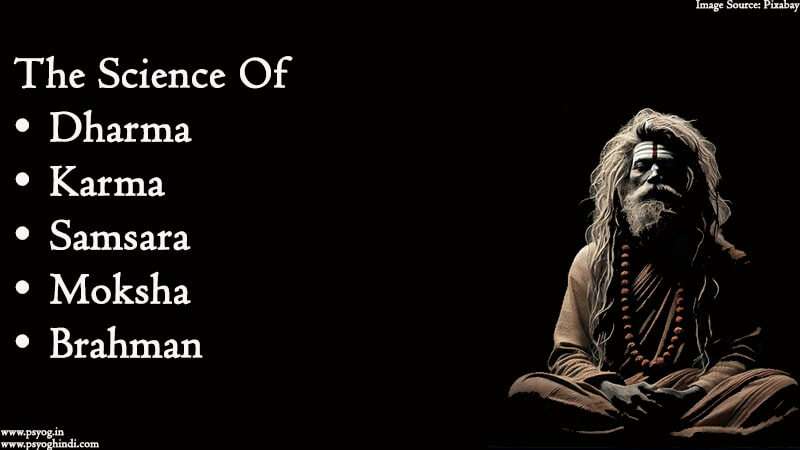Hinduism 5 Major Beliefs
Hinduism 5 major beliefs
This article is not just devoted for Hinduism 5 major beliefs or Hinduism beliefs and practices, but we are going to understand it scientifically. Before we begin this article let us differentiate between the terms beliefs, and seeking as this will form the crux of our write-up. So a belief simply means we make conclusions about something that we do not understand. It means believing in existence of something, that we have no experienced. Belief is not necessarily a fact, or a truth, but just an idea that we hold in our mind. Hence, believing in something that we have not experienced, keeps our devotion superficial, and limited.
One the contrary, seeking is a scientific approach, wherein a person only believes, after experiencing. As most people know, in Hinduism, Moksha is of utmost importance, as that gives one freedom from birth-death cycle. And to experience Moksha, one has to do daily sadhana, and experience oneself as a soul. Therefore, in Hinduism, one seeks through intense sadhana their true nature, their oneness with god, and then believes. Now that we have understood the difference between believing and seeking, let us cover the 5 major beliefs of Hinduism, and Hinduism beliefs and practices.
"Seeking is always scientific, as opposed to believing."
- Shared from psyog.in
Share on WhatsAppHinduism beliefs and practices: Dharma
Before we understand the first belief out of the Hinduism 5 major beliefs, we must keep in mind one thing. Once we experience ourselves as a soul, then from illusion of individuality and separateness, we experience the truth of oneness. So dharma means, doing the right actions, without hurting anybody, either mentally or physically. People usually believe that dharma means doing the right actions, and forcing oneself to do so, however, it is not so.
Dharma cannot be forced, but is a natural consequence of experiencing oneself as a soul. This is because, when we experience oneness, we realize that the same life principle is operant within each and every individual. Now with that experience, ones actions naturally become all inclusive. Whatever they do, they always include the betterment of humanity as a whole in all their actions. That is why all genuine spiritual masters, are totally committed to human and planet welfare activities.
Although doing good actions is good, but we must always remember that good dharma is simply a consequence of soul realization. Now that we have understood dharma, now let us cover the remaining Hinduism 5 major beliefs and Hinduism beliefs and practices. (Read: Science of sanatan dharma)
"When we see the same life everywhere, we naturally become responsible."
- Shared from psyog.in
Share on WhatsAppKarma
If we’d ask you that what karma is, you will most likely say our thoughts, actions, and the law of cause-effect. People think that karma means that good actions give good results, and we can change our life with the right karma. Although that is true, but because Moksha is the main pillar of Hinduism, so things change when we understand things from that perspective. Keep reading because you will learn something new here.
So karma is not merely physical and psychological action, but also is the residual that our actions leaves on us. Every thought, every action leaves an imprint on our system, in the form of information. When the soul leaves the planet with these imprints as unfulfilled desires, then it is bound to come back to this planet. That is why, our mind and body is simply collection of information coming through our genes and DNA, which also controls how we think. So it is valid to say, that our current physical form is the result of our past karma, and the more we remain entangled in it, the more we get away from Moksha. So karma not only deals with actions and cause-effect, but also information, residual, and rebirth. Interesting, isn’t it? Now let us move forward towards the remaining 5 major beliefs in Hinduism and Hinduism beliefs and practices.

Samsara
Do you know what samsara is? Samsara translates to worldly affairs if we want to know it simply, but it is much deeper than that. Samsara in reality means the world that is ruled by time, and is cyclical in nature. For example, because time is cyclical, hence it is repetitive, like we have repetitions: hot-cold, night-day, rain-sun, and so on. Everything on the physical plane is simply ruled by time, including our physical bodies. That is why we often say that “his time was over,” when someone departs, “time heals everything” when things are rough, or “he is having the time of his life,” when things are smooth.
Glued to our physical structures, we totally remain at the mercy of planets, which control us through our past karma. On the physical plane, there are countless people who have achieved a lot, but still feel that they have reached nowhere. A lot of people feel lifeless, and as if nothing counts. Do you know why this happens? Because we are governed by time, and time ensures that we never go straight, but in cycles. We do not move an inch. That is why in Hinduism, so much emphasis is given to disconnecting from the mind and body, as that takes us into the zone of nothingness. In that space, we remain thoughtless and do not generate more karma. This cleans all our imprints, and we get freedom from the cycles of samsara. Now let us understand the remaining 5 major beliefs of Hinduism. (Read: How to get into a zero thought state?)
Moksha
As we mentioned in the beginning of this article, Moksha is the primary goal in Hinduism. In fact all the Hinduism beliefs and practices revolve around Moksha. So what is Moksha? Moksha means liberation, but liberation from what? Liberation from the physical plane of boundaries and time. However, just by aiming for Moksha, one does not get it, the methodology is different.
We need to understand that Moksha is not an aim in itself, but is simply a consequence of disconnecting from our physical bodies, hence information. However, currently we are living in materialistic world, wherein we try to derive pleasure through material things. Be it food, vehicles, gadgets and so on, but everything that we do, is done to enhance our experience of life.
Nonetheless, most of forget the cyclical nature of physical plane. Only when people start feeling that their life is getting monotonous despite having it all, they would truly begin to dissolve their physicality. Disconnected from physicality, such people naturally transition into the spiritual dimension, and live in a way that does not create new karma. We must remember that our soul seeks liberation, and not entrapment, and for that, we need to be free of karma.
Atman
Out of all the Hinduism 5 major beliefs, this one is one of the most important. So what is atman? Simply put atman means soul, but what does it mean from the perspective of Hinduism beliefs and practices? Atman, as per Hinduism is that all encompassing pure consciousness from which everything comes out, and goes back. As we mentioned before, that soul realization forms the crux of Hinduism, and this is what this belief is all about.
In this state, we leave the physical plane of boundaries, and experience the one boundless source, which people call god, soul or consciousness. This is the highest human experience one can have, and also is the real desire of the soul, that we keep confusing with material desires. The soul simply wants to experience itself as an infinite being, and not finite flesh.
Through daily practice like meditation, chanting and through different limbs of yoga, one walks on the spiritual path, with the sole purpose of soul realization. Seekers live in a way, that they remain detached from their physical selves, hence do not got entangled with worldly affairs as that builds karma. Although this sounds tough, but when we realize that we are actually trapped in a finite body, then our desire changes.
"We truly become one not by talking, but by soul realization."
- Shared from psyog.in
Share on WhatsAppConclusion
So these were the main 5 beliefs of Hinduism and Hinduism beliefs and practices. Hinduism is the oldest way of life to have existed on this planet. However, it has lost its scientific touch. Because of various corrupt practices and different outlooks, from a science, Hinduism has started to take the shape of a belief system. We must never forget that what is the main difference between believing and seeking, and must always seek.
This way of life is not only good for us, but also the entire planet. This is because; true spiritual people have understood that their physical self is a trap. Hence, they only live in a way which helps them disconnect from their physical selves. To do that, seekers are involved in several selfless service activities: they only involve themselves in actions that do not involve any personal gain. That is why we say that, if we all become seekers, then world surely would return to golden age.
We hope that you liked our article on the topic: Hinduism 5 major beliefs and Hinduism beliefs and practices. If you liked what you read, then do share it with your friends.
FAQs
What are the 5 main practices of Hinduism?
The following are the 5 main practices of Hinduism:
- Atman: experience oneself as a boundless soul existing beyond the world of matter and boundaries.
- Dharma: being atman and with an experience of oneness, seekers do right dharma and never involve in any kind of malpractice.
- Karma: seekers live in a way that does not build up any more karma. This is because they do not want to return to the finite world of flesh and matter.
- Samsara: samsara means cycles of birth-death. In Hinduism, seekers realize that the time bound physical plane is cyclical, hence ensures that we do not move ahead. Therefore, they live in a way that frees them from samara.
- Moksha: Moksha means freedom from the limited physical plane. When seekers become free of karma through spiritual practices, then seekers attain Moksha, and exist in that infinite space of love.



